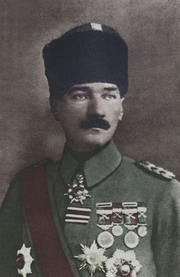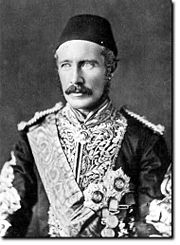Pasha

Pasha or pacha, formerly bashaw, (Turkish: paşa [1]) was a high rank in the Ottoman Empire political system, typically granted to governors, generals and dignitaries. As an honorary title, Pasha, in one of its various ranks, is equivalent to the British title of Lord, and was also one of the highest titles in pre-republic Egypt.
Contents |
Linguistics
The word pasha entered English from Turkish paşa.[1] Etymologists variously derive the word paşa from the Turkish baş or baş ağa, "head, chief",[1][2] or from Persian: پادشاه pādshāh.[3] Old Turkish had no fixed distinction between /b/ and /p/, and the word was spelled başa still in the 15th century.[4] As first used in western Europe, the title appeared in writing with the initial "b". The English forms bashaw, bassaw, bucha etc., general in the 16th and 17th century, derive through the medieval Latin and Italian word bassa. Due to the Ottoman presence in the Arab World, the title became used frequently in Arabic, though pronounced as basha due to the absence of the letter "p" in Arabic. Alternatively, the word could derive from Persian "pa", meaning foot, and "shah", meaning king, making the title "the foot of the king".
Role in Ottoman and Egyptian political systems

The Ottoman Sultan and his nominal vassal the Khedive of Egypt had the right to bestow the title of Pasha. The title appears, originally, to have applied exclusively to military commanders, but subsequently it could distinguish any high official, and also unofficial persons whom the court desired to honour.

It was also part of the official style of the Kaptan Pasha (Great Admiral of the entire Ottoman fleet).
Pashas ranked above Beys and Aghas, but below Khedives and Viziers.
Three grades of Pasha existed, distinguished by the number of yak- or horse-tails (three, two and one respectively; a symbol of Turco-Mongol tradition) or peacock tails, which the bearers were entitled to display on their standard as a symbol of military authority when on campaign. Only the Sultan himself was entitled to four tails, as sovereign commander in chief.
The following military ranks entitled the holder to the style Pasha (lower ranks were styled Bey or merely Effendi):
- The Vizier-i-Azam (Grand Vizier, the prime minister, but also often taking the field as Generalissimo instead of the Sultan)
- Mushir (Field marshall)
- Ferik (army Lieutenant-general or navy Vice-admiral)
- Liva (major general or Rear-admiral)
- The Kizlar Agha (chief black eunuch, the highest officer in the Topkapı Palace; three tails, as commander of the baltacı corps of the halberdiers in the imperial army
- Istanbul's Shaikh ul-Islam, the highest Muslim clergyman, of cabinet rank.
If a Pasha governed a provincial territory, it could be called a pashaluk after his military title, besides the administrative term for the type of jurisdiction, e.g. eyalet, vilayet/walayah. Both Beylerbeys (governors-general) and valis/wālis (the most common type of Governor) were entitled to the style of Pasha (typically with two tails). The word pashalik designated any province or other jurisdiction of a Pasha.
Ottoman and Egyptian authorities conferred the title upon both Muslims and Christians without distinction. They also frequently gave it to foreigners in the service of the Ottoman Empire or of the Egyptian Khedivate (later Sultanate, and Kingdom in turn), e.g. Hobart Pasha.
Honorific
In usage, the title followed the given name. Although the word serves as a non-hereditary title, English speakers have commonly used the word pasha as if it formed part of a personal name, as for instance in Ibrahim Pasha or Emin Pasha, similar to the practice of referring to a British Peer as Lord X, since in both cases it substitutes for a more precise rank title.
The sons of a Pasha were styled Pashazada or Pasha-zade, which means just that.
In modern Egyptian and (to a lesser extent) Levantine Arabic, it is used as an honorific closer to "Sir" than "Lord," especially by older people.
List of notable pashas


- Abaza Family - Egyptian Pashas and Beys
- Abbas I of Egypt
- Abbas II of Egypt
- Ahmed Pasha (Claude Alexandre de Bonneval)
- Ali Pasha — statesman
- Barbarossa Khair ad-Din Pasha
- Cigalazade Yusuf Sinan Pasha
- Emin Pasha
- Enver Pasha
- Essad Pasha
- Fakhri Pasha
- Fuad Pasha
- Glubb Pasha (John Bagot Glubb)
- Gordon Pasha
- Hagop Kazazian Pasha
- Hobart Pasha
- Hussein Refki Pasha
- Ibrahim Pasha
- İsmet Pasha (İsmet İnönü)
- Jafar al-Askari
- Jamal Pasha
- Judar Pasha - Moroccan general
- Kara Mustafa Pasha
- Kazazian Pasha
- Kilic Ali Pasha
- Multiple members of the Köprülü family, especially Kara Mustafa Pasha
- Lala Kara Mustafa Pasha
- Liman von Sanders Pasha
- Mahmud Dramali Pasha — Ottoman general
- Mehmed Pasha Sokolović
- Melling Pasha
- Midhat Pasha
- Müezzinzade Ali Pasha — Ottoman admiral
- Muhammad Ali Pasha — viceroy of Egypt
- Mustafa Kemal Pasha, subsequently known as Mustafa Kemal Atatürk, founder of the post-Ottoman Turkish republic
- Mustafa Reshid Pasha
- Nubar Pasha
- Osman Pasha
- Piyale Pasha
- Riyad Pasha — Egyptian statesman
- Said Pasha
- Sinan Pasha
- Stone Pasha
- Sulejman Pasha
- Sultan al-Atrash
- Talat Pasha
- Tewfik Pasha
- Turhan Pasha Përmeti
- Tusun Pasha
- Urabi Pasha
- Valentine Baker
- Wehib Pasha
- Woods Pasha
- Youssef Wahba Pasha — Egyptian Prime Minister
- Yusuf Karamanli Pasha of Tripoli
See also
- Ottoman Empire
- Ottoman titles
Notes
- ↑ 1.0 1.1 1.2 "pasha." Online Etymology Dictionary. 2001.
- ↑ "pasha". Funk & Wagnalls Standard Dictionary. The New American Library. 1980. pp. 578. ISBN 0-451-12540-1.
- ↑ [1]
- ↑ Tietze, Andreas (2002). "başa" (in Turkish). Tarihi ve Etimolojik Türkiye Türkçesi Lugatı. Simurg Kitapçılık. pp. 290. ISBN 9789757172567.
References
 This article incorporates text from a publication now in the public domain: Chisholm, Hugh, ed (1911). Encyclopædia Britannica (Eleventh ed.). Cambridge University Press.
This article incorporates text from a publication now in the public domain: Chisholm, Hugh, ed (1911). Encyclopædia Britannica (Eleventh ed.). Cambridge University Press.- AllAboutTurkey.com - The Ottoman harem